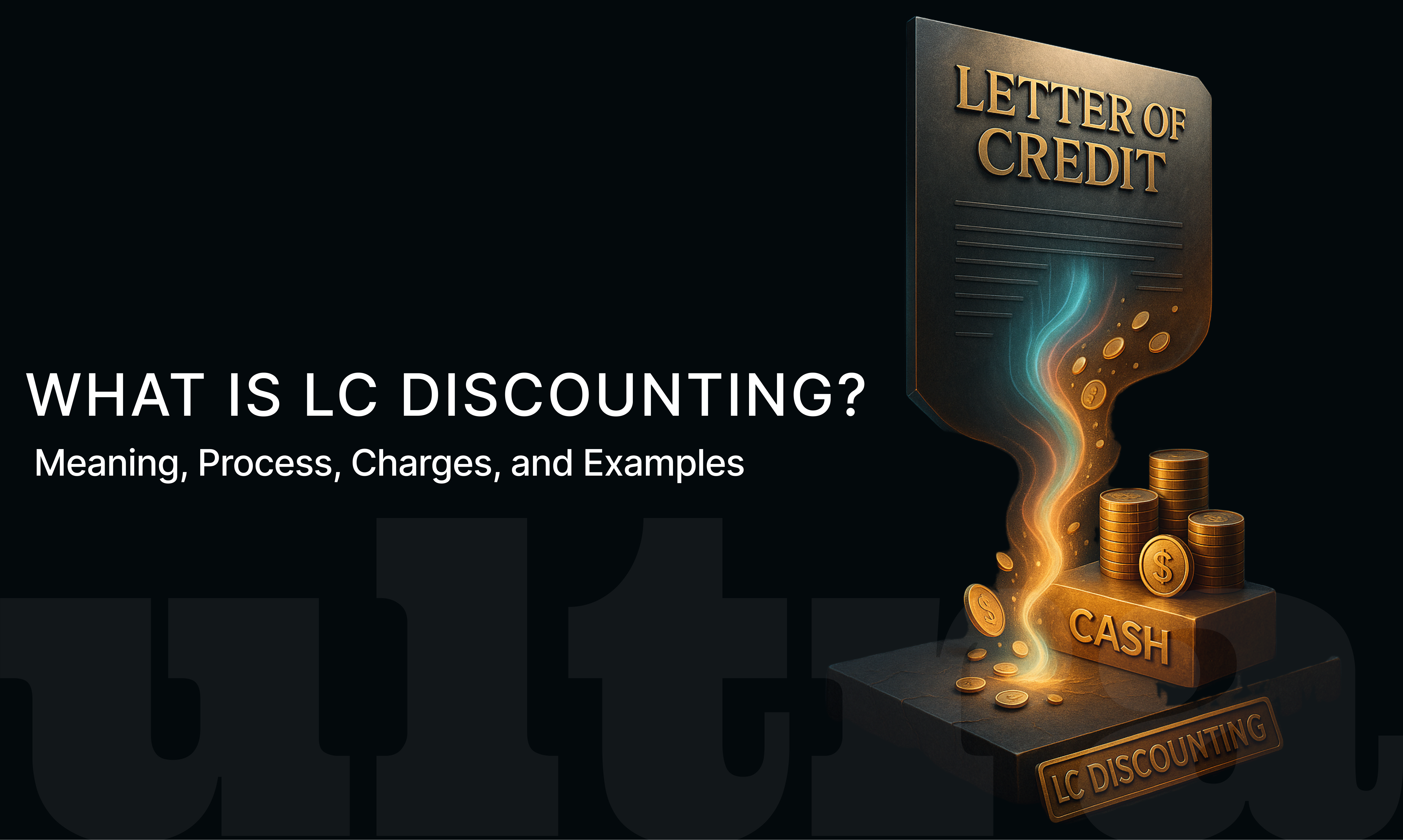What is LC Discounting?
08 September 2025 · Sachin
LC Bill Discounting – Meaning, Process, Charges, and Examples

What is LC Discounting?
In international and domestic trade, buyers and sellers often rely on financial instruments to ensure smooth transactions. One such instrument is the Letter of Credit (LC), widely used in global trade. LC discounting is a financing solution that allows exporters or sellers to receive immediate funds by discounting the bills backed by an LC.
This article explains LC discounting meaning, charges, process, and examples to help businesses understand how it works and why it plays a vital role in managing cash flow.
LC discounting, or LC bill discounting, is a financial arrangement where banks or financial institutions provide funds to exporters against the bills backed by a Letter of Credit issued by the buyer’s bank.
In simple terms, when a seller ships goods and submits documents under an LC, instead of waiting for the payment due date, they can approach their bank to get funds upfront after deducting a discounting charge.
Key Points:
It improves liquidity for exporters.
The bank assumes lower risk since the LC guarantees payment from the buyer’s bank.
Discounting charges are applied based on tenure, risk profile, and market conditions.
LC Discounting Meaning Explained
To simplify, an LC is a guarantee from the buyer’s bank assuring that the seller will receive payment once they fulfill the conditions (like shipping documents).
LC discounting meaning: It is the practice of getting funds before the due date by presenting the bills backed by the LC to a financial institution, which then pays the exporter after deducting charges.
This helps businesses avoid cash flow gaps and continue operations smoothly.
LC Discounting Process
The LC discounting process generally involves the following steps:
Issuance of LC – The buyer’s bank issues a Letter of Credit in favor of the seller.
Shipment of Goods – The seller ships the goods to the buyer and prepares the necessary documents.
Document Submission – The seller submits shipping documents (like invoice, bill of lading, etc.) to their bank.
Discounting Request – The seller requests their bank to discount the bill under the LC.
Bank Verification – The bank verifies the documents as per LC terms.
Fund Disbursement – The bank releases funds to the seller after deducting the LC discounting charges.
Payment Settlement – On maturity, the buyer’s bank pays the seller’s bank, completing the transaction.
LC Discounting Example
Suppose an exporter ships goods worth ₹50,00,000 to an overseas buyer under an LC payable in 90 days. Instead of waiting, the exporter approaches their bank for LC bill discounting.
The bank verifies the documents.
After deducting LC discounting charges of, say, ₹50,000, the bank pays the exporter ₹49,50,000 immediately.
On maturity, the buyer’s bank settles the payment with the seller’s bank.
This example shows how LC discounting bridges the liquidity gap for exporters.
LC Discounting Charges
The LC discounting charges depend on several factors:
Tenure: Longer credit periods attract higher charges.
Bank Policies: Each bank sets its own discounting rates.
Risk Profile: Charges may vary depending on the buyer’s and seller’s credibility.
Currency Fluctuations: In case of international trade, forex risks may affect charges.
Typically, charges include:
Discounting Rate (interest on the discounted amount).
Processing Fees (administrative charges).
Foreign Exchange Charges (for international LCs).
Benefits of LC Discounting
Improves Cash Flow: Sellers get instant liquidity.
Reduces Risk: Banks face lower default risk due to LC backing.
Encourages Trade: Builds trust between buyers and sellers.
Supports SMEs: Helps small and medium enterprises manage working capital efficiently.
Difference Between LC Discounting and Bill Discounting
| Particulars | LC Discounting | Bill Discounting |
|---|---|---|
| Basis | Involves Letter of Credit | Involves bills of exchange |
| Risk | Lower risk (bank guarantee) | Higher risk (depends on buyer’s payment) |
| Security | Backed by LC issued by buyer’s bank | Backed by buyer’s promise |
| Usage | Common in international trade | Common in domestic trade |
Conclusion
LC discounting is a vital financing tool that ensures businesses, especially exporters, maintain smooth operations without liquidity issues. By leveraging bills backed by a Letter of Credit, sellers can get early access to funds while reducing risk for banks.
For those looking to explore alternative financing and investment opportunities, platforms like Ultra provide innovative solutions, including access to diverse investment options and unlisted shares. Ultra helps investors and businesses alike to manage and grow their wealth efficiently.
FAQs
Q1. What is LC discounting in simple terms?
LC discounting is when banks provide upfront funds to sellers against bills backed by a Letter of Credit, after deducting charges.
Q2. How are LC discounting charges calculated?
Charges depend on tenure, risk profile, and bank policies, including interest, processing fees, and forex charges.
Q3. Is LC discounting safe?
Yes, since the payment is guaranteed by the buyer’s bank, the risk is relatively low.
Q4. Can small businesses use LC discounting?
Yes, SMEs engaged in domestic or international trade can benefit from LC bill discounting to manage working capital.
Q5. What is the difference between LC discounting and bill discounting?
LC discounting is backed by a Letter of Credit and carries lower risk, while bill discounting is based on the buyer’s promise and carries higher risk.